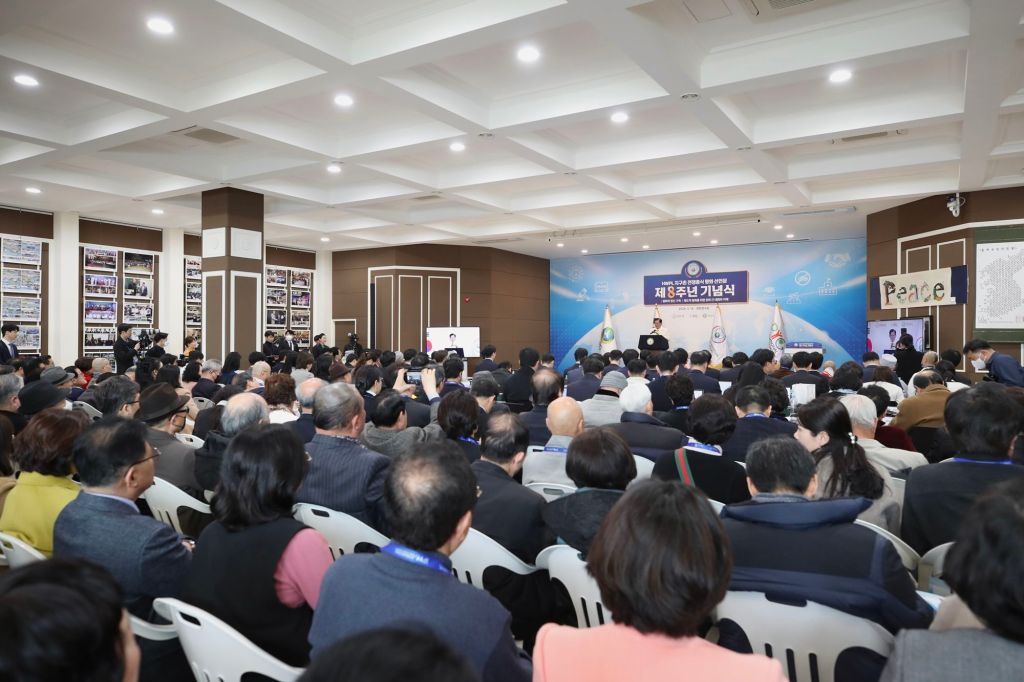
In 2023 alone, conflicts like the Russia-Ukraine war, the Israel-Hamas war, and numerous international disputes tragically claimed the lives of over 33,000 civilians and displaced millions. Recognizing this dire reality, Heavenly Culture, World Peace, Restoration of Light (HWPL), an international peace NGO, held its 8th annual commemoration of the Declaration of Peace and Cessation of War (DPCW) on March 14th at its peace training institute in Gapyeong-gun, Gyeonggi-do, South Korea. The event’s theme resonated deeply: “Building the Minds of Peace: Promoting Institutional Peace via Intercultural Dialogue and Understanding.”
Since the DPCW’s proclamation on March 14, 2016, HWPL has consistently held annual commemorative ceremonies to advocate for the institutionalization of peace. This year, the event gathered about 12,500 distinguished experts from diverse fields – political, legal, religious, educational, media, and representatives from women and youth sectors – both online and in person. Among participants, about 10,000 HWPL members moved in an orderly manner under the guidance of staff and filled the commemorative ceremony venue.
Drafted in collaboration with international legal specialists from 15 countries, the DPCW comprises 10 articles and 38 clauses. It outlines the principles and tools necessary to prevent and resolve conflicts, cultivate a peaceful global society, and defines clear roles for individuals, communities, and nations in achieving lasting peace.
In his congratulatory speech, H.E. Vidura Wickramanayaka, Minister of Buddhasasana, Religious and Cultural Affairs of Sri Lanka, said, “The commitment and dedication shown in the pursuit of peace projects have not only been commendable but have also laid the foundation for a more harmonious world. The tireless efforts of individuals and organizations working towards the common goal of ending war and fostering understanding among nations are truly inspiring.”
As President of the Daegak Buddhism Jogye Order in South Korea, Ven. Beopsan who has been participating in interreligious dialogue for nine years, emphasized the importance of religious leaders’ participation in peacebuilding efforts including comparative study of scriptures. He said, “Intercultural dialogue and understanding can be found at HWPL’s World Alliance of Religions’ Peace Office. The root of religion is one and its meaning is a truly noble value.”
Having pointed out that conflicts caused by religion have threatened global peace, Chairman Man-hee Lee of HWPL said, “Different religions should come together, learn each other’s values and become one by comparative study on scriptures. Religious communities should practice faith based on scriptures, so they can live with humanity on this earth. We must create a world where people communicate, cooperate, and help each other regardless of religion,”

Lastly, the ceremony concluded with a variety of performances depicting the journey of peace. During the performance, there was a session where the contents of Article 10, 38 clauses of the DPCW were explained through performance, and expressed an image of a paradise filled with flowers where peace was achieved.
Kolle George Nkume, station Manager of Cameroon Radio Television (CRTV) Mount Cameroon Fm Buea, who attended this event emphasized the importance of intercultural dialogue in effectively promoting peace by saying “Institutional peace must reflect societal demands, it must reflect the culture of the society, and it must reflect the ideas of the society.”
IGIHE journalist Théophile Niyitegeka agreed with the theme of this event, emphasizing the importance of intercultural exchange in promoting peace within society and institutions. He highlighted the significance of cultural dialogue in fostering institutional peace, stating, ” Intercultural exchange is paramount in promoting peace in societies and institutions. The growth can only be attained by turning cultural differences into solutions to usher themselves into a shared future and promote peaceful coexistence”
HWPL is actively engaging in various peace initiatives in Thailand to improve the negative perceptions of the southernmost region. Efforts include the Pattani Eco Project aimed at boosting the economy of southern Thailand by transforming it into a tourist destination, as well as conducting cultural exchange programs and human rights webinars. These activities seek to motivate individuals to recognize the importance of youth empowerment and HWPL’s peace activities, fostering collaboration towards the establishment of peace-promoting international laws. Through such endeavors, HWPL is striving to achieve institutional peace, with expectations for further initiatives to enhance the perception of the southernmost region and realize peace within Thailand.
The armed attacks in Burkina Faso have persisted since 2015, resulting in an estimated 20,000 casualties and over 2 million displaced individuals. Since 2019, HWPL has been tirelessly striving for peace, starting with the Peace Summit held in Waga-Dugu, Burkina Faso. The proactive support from Burkina Faso’s public institutions, as highlighted in the book “The Truth of HWPL: Cessation of War and Peace,” is eagerly anticipated. This book introduces Article 38 of the Declaration of Peace and Cessation of War (DPCW), authored by renowned international legal experts, advocating for a pragmatic approach towards sustainable peace through conflict prevention, mediation, and resolution.
The expectation is that such efforts in Burkina Faso will lead to the institutionalization of global peace, with HWPL leading the way through its vigorous activities.

